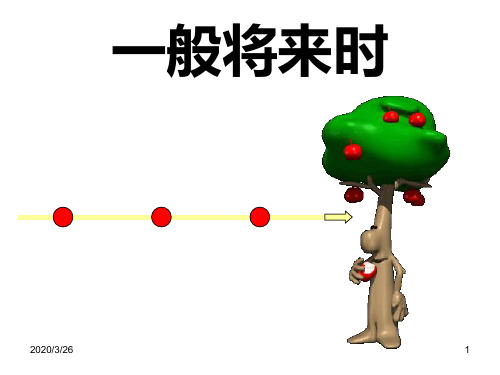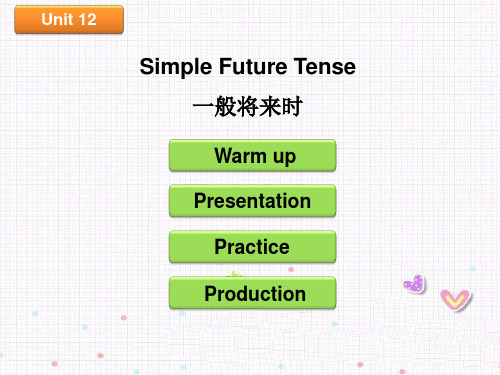小学语法一般将来时(课堂PPT)
合集下载
英语语法 一般将来时(共12张PPT)

上一页
第1页,共12页。
时态:一般将来时 The Simple Future Tense
3、 shall与will的区别:
shall常用于第一人称(we/ I ).
shall
否定式:shall not = shan’t
缩略形式 ’ll
will常用于第二、三人称,但在口 will 语中各种人称都可以用will.
is about to leave for Beijing. eg: He Will there be only one country?
注:after+时间段,往往指过去的一段时间。
next Saturday. We will start off in ten minutes.
I was about to start out when it
•
Yes, there will. / No, there won’t.
第9页,共12页。
What can you see in this picture?
There will be…将会有
There will be more people. There will be fewer trees. There will be more pollution. There will be more buildings. There will be more cars.
supper time.
上一页
主菜单 第5页,共12页。
下一页
● 一般将来时 ●
be about to do:表示“即将做某 事”或“将
要做某事” 如come, go, arrive, leave, start, return, meet, get等。
第1页,共12页。
时态:一般将来时 The Simple Future Tense
3、 shall与will的区别:
shall常用于第一人称(we/ I ).
shall
否定式:shall not = shan’t
缩略形式 ’ll
will常用于第二、三人称,但在口 will 语中各种人称都可以用will.
is about to leave for Beijing. eg: He Will there be only one country?
注:after+时间段,往往指过去的一段时间。
next Saturday. We will start off in ten minutes.
I was about to start out when it
•
Yes, there will. / No, there won’t.
第9页,共12页。
What can you see in this picture?
There will be…将会有
There will be more people. There will be fewer trees. There will be more pollution. There will be more buildings. There will be more cars.
supper time.
上一页
主菜单 第5页,共12页。
下一页
● 一般将来时 ●
be about to do:表示“即将做某 事”或“将
要做某事” 如come, go, arrive, leave, start, return, meet, get等。
(完整版)一般将来时课件(PPT)

①
②
③
① Who will have an English party next week ?
② What will they have next week ?
③ When will they have an English party?
2. be going to 表将来
will 和be going to 的区别
回答:(肯)Yes,主语+will. (否)No,主语+won’t.
Yes,they will./No,they won’t.
They won’t(will not) have an English party next week.
注意:won’t=will not
(3).变特殊疑问句
They will have an English party next week.
他现在在北京。 He __i_s_ in Beijing now.(be)
他昨天在上海。
He w__a_s in Shanghai yesterday. (be) Hew_i_ll_be in Shanghai tomorrow. (be)
二、一般将来时的时间状语
1.与“tomorrow一家” 连用:
buy the oranges tomorrow?
2.Who _w_i_ll_i_n_ve_n_t (invent) a new
computer in 2050? 3.We _w_il_l _g_o (go) to the cinema next
Sunday. The film _w_il_l _b_e (be) very
6. He usually _g_e_t_s (get) up at 6 in the morning. Look! He i_s_g_e_t_t_in(gget) up now. But yesterday he _g_o_t_ (get) up very late, so he _w_e_n_t (go) to
(完整版)一般将来时课件(PPT)

tomorrow the day after tomorrow tomorrow morning tomorrow afternoon tomorrow evening at 7:00 tomorrow morning ……
2.与“next一家” 连用
next
time year week month term Monday at 7:00 next Sunday morning ……
2.He will find some meat in the fridge soon. (变一般疑问句) W __i_ll he _f_in_d _a_n_y_ meat in the fridge?
3.She will stay there in a week. (对划线部分提问) __H_o_w _s_o_on_ w_i_ll__ she _s_t_a_y_ there?
We will/shall go to Beingjing next week.
He will go to Beingjing next week
(2).变一般疑问句和否定句:
They will have an English party next week. Will they have an English party next week?
2. be going to+do可表示事先计划的意图,而 will 则表示说话人当时决定的意图;
We're going to drive you home after the meeting. Don't call a taxi. We'll drive you home.
I feel ill now, and I'll go to see the doctor. I'm going to see the doctor this evening.
2.与“next一家” 连用
next
time year week month term Monday at 7:00 next Sunday morning ……
2.He will find some meat in the fridge soon. (变一般疑问句) W __i_ll he _f_in_d _a_n_y_ meat in the fridge?
3.She will stay there in a week. (对划线部分提问) __H_o_w _s_o_on_ w_i_ll__ she _s_t_a_y_ there?
We will/shall go to Beingjing next week.
He will go to Beingjing next week
(2).变一般疑问句和否定句:
They will have an English party next week. Will they have an English party next week?
2. be going to+do可表示事先计划的意图,而 will 则表示说话人当时决定的意图;
We're going to drive you home after the meeting. Don't call a taxi. We'll drive you home.
I feel ill now, and I'll go to see the doctor. I'm going to see the doctor this evening.
一般将来时课件(PPT)

“be able to”表示将来有能力做某 事时,使用一般将来时形式,例如“I will be able to help you”。
情态动词如“can”、“may”、 “must”等,在一般将来时中通常直 接加动词原形,例如“I can swim”。
03
一般将来时在句子中的运用
陈述句中的使用
表示将要发生的动作或存在的状态
纠正方法
应使用正确的将来时形式,如 "He will go to the park tomorrow." 或 "He is going to the park tomorrow."
忽略动词变化规则
错误示例
They will play football in the future.(忽略了动词play在将来时中的变化)
纠正方法
在将来时中,应使用正确的助动词或情态动词形式,如 "I will be able to help you with your homework." 或 "I can help you with your homework."
错误示例
He will must finish his work before leaving.(错误地使 用了情态动词must)
作用
用于表示未来的计划、打算、预测、 假设等。
常见表达形式
will + 动词原形
表示将来的动作或状态,如“I will go to the park tomorrow.”(我明天将去公园。)
be going to + 动词原形
表示计划、打算或即将发生的动作,如“I am going to study hard this semester.”(我这 学期打算努力学习。)
一般将来时态讲解(共25张PPT)

• I wonder what will happen. • 我不知道将会发生什么事。
• I don't think the test will be very difficult. 。
②用于“祈使句 + and + 陈述句” 中
I don’t think it will rain this afternoon.
I am hungry. I think I’ll have something to eat.
表示看法,观点
“There be”句型的一般将来时 肯定句: There will be +名词+其他成份 [注意]:无论后面加单数名词或复数形式,be都必须用原形。
shall适用于第一人称I,We;而will适用于所有人称。 通常可以用will来代替shall。 will,shall均可缩写为:'ll,如:
I will= I'll; she will = she’ll;will not 和shall not分别可以 缩写为 won't 和shan't。
1.一般将来时的用法
4. be about to + 动词原形。 表示 (1)“即将做”或“马上做”
(2)因此,句子不能再用时间状语。
Don’t leave. Li Lei is about to come. 不要走了,李蕾就要来了。 Be quiet. The concert is about to start. 安静下来,音乐演唱会就要开始了。
• My uncle will come to see me every Saturday.
• 我叔叔每个星期六都会来看我。
• The students will have five English classes per week this term.
• I don't think the test will be very difficult. 。
②用于“祈使句 + and + 陈述句” 中
I don’t think it will rain this afternoon.
I am hungry. I think I’ll have something to eat.
表示看法,观点
“There be”句型的一般将来时 肯定句: There will be +名词+其他成份 [注意]:无论后面加单数名词或复数形式,be都必须用原形。
shall适用于第一人称I,We;而will适用于所有人称。 通常可以用will来代替shall。 will,shall均可缩写为:'ll,如:
I will= I'll; she will = she’ll;will not 和shall not分别可以 缩写为 won't 和shan't。
1.一般将来时的用法
4. be about to + 动词原形。 表示 (1)“即将做”或“马上做”
(2)因此,句子不能再用时间状语。
Don’t leave. Li Lei is about to come. 不要走了,李蕾就要来了。 Be quiet. The concert is about to start. 安静下来,音乐演唱会就要开始了。
• My uncle will come to see me every Saturday.
• 我叔叔每个星期六都会来看我。
• The students will have five English classes per week this term.
一般将来时课件ppt(共17张PPT)

Jim going to
afternoon?
in the playground tomorrow
4. .Jim is going to play football in the playground tomorrow afternoon.
Jim going to play football tomorrow afternoon?
2)在浊辅音和元音后读/d/.
一般过去时, 要用动词过去式. Jim is going to play football in the playground tomorrow afternoon.
Jim is going to play football in the playground tomorrow afternoon. ⑵are变为were。
there were many beautiful flowers there. 一般将来时表示将来某个时间要发生的动作或存在的状态常与表示将来的时间状语连用
⑴am ,is变为was。
So she They to read some books.
What did they do in the park? 1)在清辅音后读/t/ .
(3).动词过去式变化规则
a)一般情况下,直接加ed.如:wash--washed, look---looked; b)以不发音字母e结尾的,加d.如:like---
liked, dance---danced; c)以“辅音字母+y”结尾的,变y为i再加ed. 如:study---studied;
food and (play) lots of games. They
(come) home at 4:30.
一般将来时PPT课件

05
解析
含有will的句子改为否定句时 ,在will后加not,缩写为 won't。
06
THANKS
感谢观看
06
一般将来时练习题精选与解析
选择题精选与解析
01
题目:I _______ to the cinema. Will you go with me?
02
A. go B. am going C. have gone D. went
选择题精选与解析
答案:B
解析:由后一句“Will you go with me?”可知是打算去做某事,是一般将来时,所以用现 在进行时表将来,选B。
题目:— What _______ you _______ to do tomorrow?
选择题精选与解析
— I _______ visit my uncle. A. are; going; am going B. are; going; am going to
C. are; going to; am going D. are; going to; am going to
区别
现在进行时强调当前正在进行的动作 或状态,而一般将来时则强调未来将 要发生的动作或状态。
联系
两者都可用于表示将来的情况,但侧 重点不同。现在进行时通过现在正在 进行的动作暗示将来,而一般将来时 则直接表达将来的动作或状态。
与过去将来时的区别与联系
区别
过去将来时表示从过去某一时间 看将要发生的动作或状态,而一 般将来时则是从现在看将来要发 生的动作或状态。
表示将来经常发生的动作或习惯
常用的时间状语
always, often, usually等 。
句子结构
小学语法一般将来时PPT课件

They are going to have a trip.
He is going to make a plane model.
I am going to get up early.
2020/3/26
5
一般将来时
否定句 主语+be(am/is/are ) not going to+动词原形+…
She isn’t going to see a movie.
C.还可以表示安排或计划中的动作。
It’s going to rain soon.
We are not going to see a film together.
2020/3/26
9
一般将来时
2、用will构成的将来时,所表示的动作 与人的主观愿望无关。
I will graduate from this school soon.
You will stay alone after I leave.
2020/3/26
10
一般将来时
3、shall和will在口语的一些疑问句中相 当于情态动词。Shall一般与第一人称连 用,will多与第二人称连用。
Shall we go to the zoo next Saturday?
Will you please open the box for
一般将来时
2020/3/26
1
一般将来时
2020/3/26
2
一般将来时
2020/3/26
3
结构一:般将来时
•1、主语 +be(am/is/are ) going to+动词原形 +…
2020/3/•26 2、主语+will+动词
《一般将来时》课件

be going to+动词原形
结构
主语+be going to+动词原形+其他 成分
例子
We are going to meet at the train station at 5:00.(我们计划在5点钟 在火车站见面。)
含义
表示计划或安排将来要发生的动作或 状态
用现在进行时表示
结构
主语+be+动词现在分词+ 其他成分
一般将来时可以用来表示对未来事件的预见或推测,通常与时间状语连用,如“in the future”、 “next year”等。例如,“It will rain tomorrow.”(明天会下雨。)
表示意图、打算或希望
总结词
表示个人的意图、打算或意图、打算或希望,通常与 表示意图的动词连用,如“plan”、“intend”、“hope” 等。例如,“I will visit my grandparents next week.”( 我打算下周去看望我的祖父母。)
含义
表示将来某个时间正在进 行的动作或状态
例子
He is coming here next week.(他下周将会来这 里。)
用一般现在时表示
结构
主语+动词原形+其他成分
含义
表示将来某个时间经常发生的动作或状态
例子
I do my homework every day.(我每天都会做作业。)
03
一般将来时的肯定句、否定句和 疑问句
感谢观看
基本构成
will + 动词原形
疑问句形式
Will + 主语 + 动词原形
否定句形式
一般将来时课件PPT.上课用

注意事项
与“be going to + 动词原形”和“will + 动词原形”相比,“be about to + 动词原形”更强调即将发生的紧迫性。
04
一般将来时的否定形式
will not = won’t
01
"will not" 是 "will" 的否定形式 ,表示将来某个时间不会发生某 件事情。
明年这个时候我们将在巴黎度假。
表示未来的时间状语从句的连用
一旦你完成这个项目, 你就可以休息了。
即使明天下雨,我们 也会按时举行运动会。
只要他一回来,我们 就出发。
表示未来的时间状语从句的省略
明天见。 下周再见。
明天这个时候我们会在飞机上。
THANKS
主语 + will not + 动词原形 + 其他成分,例如:He will not come back until next month.(他下个月之前不会回来。)
Will + 主语 + 动词原形 + 其他成分,例如:Will you be available this afternoon?(你今天下午有空吗?)
表示预测和推测
总结词
一般将来时也可以用来表示对未来的预测和推测,通常基于 某种事实或证据。
详细描述
当我们根据已知事实或证据推断某件事情将在未来发生时, 可以使用一般将来时。例如,“根据天气预报,明天会下雨 ”表示对天气的预测,“根据市场趋势,明年房价可能会上 涨”表示对未来的推测。
表示意愿和打算
05
一般将来时的疑问形式
will + 主语 + 动词原形?
总结词
与“be going to + 动词原形”和“will + 动词原形”相比,“be about to + 动词原形”更强调即将发生的紧迫性。
04
一般将来时的否定形式
will not = won’t
01
"will not" 是 "will" 的否定形式 ,表示将来某个时间不会发生某 件事情。
明年这个时候我们将在巴黎度假。
表示未来的时间状语从句的连用
一旦你完成这个项目, 你就可以休息了。
即使明天下雨,我们 也会按时举行运动会。
只要他一回来,我们 就出发。
表示未来的时间状语从句的省略
明天见。 下周再见。
明天这个时候我们会在飞机上。
THANKS
主语 + will not + 动词原形 + 其他成分,例如:He will not come back until next month.(他下个月之前不会回来。)
Will + 主语 + 动词原形 + 其他成分,例如:Will you be available this afternoon?(你今天下午有空吗?)
表示预测和推测
总结词
一般将来时也可以用来表示对未来的预测和推测,通常基于 某种事实或证据。
详细描述
当我们根据已知事实或证据推断某件事情将在未来发生时, 可以使用一般将来时。例如,“根据天气预报,明天会下雨 ”表示对天气的预测,“根据市场趋势,明年房价可能会上 涨”表示对未来的推测。
表示意愿和打算
05
一般将来时的疑问形式
will + 主语 + 动词原形?
总结词
小学英语语法课件- 一般将来时 (共36张PPT) 全国通用

Presentation Sentences
She will take swimming lessons in this vacation. 她今年假期要去学游泳。 She is going to go shopping tomorrow. 她明天要去购物。 Jim will open a shop on internet. 吉姆打算要在网络上开个店。 Jim is going to be an actor when he grows up. Jim长大了想当一名演员。
___t_o_m_o_r_ro_w_.____________________________ 一般疑问句:A__re_t_h_e_c_h_il_d_re_n_g_o_i_ng__to__w_a_tc_h_a_d_o_l_p_h_in_s_h_o_w__
t_o_m_o_r_ro_w_?____________________________ There will be a great concert next week. 否定句:_T_h_e_r_e_w_il_l _n_o_t b_e__a_g_re_a_t_c_o_n_ce_r_t _n_ex_t_w_e_e_k_. ______ 一般疑问句:_W_i_ll_th_e_r_e_b_e_a_g_r_e_a_t _co_n_c_e_rt_n_e_x_t_w_e_e_k?______
Practice Oral Practice
小组合作完成单项选择,并朗读句子
( C ) There __________ a meeting tomorrow afternoon.
A. will be going to
B. will going to be
C. is going to be
一般将来时课件(共12张PPT)

五、用“be+动词不定式”或用“be about to +动词原形”的结构表示。如:
1. He is to visit Japan next year. 明年他
2. They're about to leave. (=They're leavi
请认真观察答句,根据答句写出问句。
are you going to do tomorrow? 1\ What __________________________________ We are going to take a trip tomorrow. 2\ __________________________________ What is Sarah going to buy? Sarah is going to buy a comic book . 3\ __________________________________ Where are they going this evening? They are going to the cinema this evening. When is Mike going to the park? 4\ __________________________________ Mike is going to the park next week. How are you going to the zoo? 5\ __________________________________ I’m going to the zoo by bike. 6\ _________________________________ Are you going to read books tonight? Yes, I am going to read books tonight. Is she going to play football after school? 7\ _________________________________ No, she is going to play basketball after school. Do you go there by bus? 8\ __________________________________ No, I go there on foot.
一般将来时课件(PPT)

现在进行时表示
总结词
表示现在正在进行的动作,暗示将来还会继 续
详细描述
现在进行时可以用来表示现在正在进行的动 作,并暗示将来还会继续。例如,“I am studying for the exam next week.”(我 正在为下周的考试学习。)
一般现在时表示
总结词
表示现在经常发生的动作或存在的状态,暗 示将来也会如此
详细描述
使用"will+动词原形"的结构来表示将来 某个时间点将要发生的动作或状态,例 如"I will go to the park tomorrow." (明天我将去公园)。
be going to+动词原形
总结词
表示计划或安排将来要发生的动作或状态。
详细描述
使用"be going to+动词原形"的结构来表示计划或安排将来要发生的动作或状 态,例如"I am going to have a party next weekend."(下周末我将举办一个 聚会)。
详细描述
使用“be going to+动词原形”的结构来表示计划或安排将来发生的动作,例如“We are going to have a par来某个时间正在进行的动作。
详细描述
使用现在进行时来表达将来某个时间正在进行的动作,例如“I am meeting my friend tomorrow” 。
一般将来时课件
目录
• 一般将来时的定义 • 一般将来时的句型结构 • 一般将来时的肯定句 • 一般将来时的否定句 • 一般将来时的疑问句
01
一般将来时的定义
什么是将来时态
01
02一般将来时课件 (共15张PPT)

注意:句型中有be动 词, 用is还是am还是 are,取决于主语.
知识讲解
will/shall+动词原形 结构
注意:will适用于任何时态, 当主语是I或we时可用shall。
will表示客观上将来势必要发生的事情 They will have a good time. He will be tweny years old next year. He will come if it doesn't rain. I will call you as soon as your daughter comes back.
总结提升
对于将要发生的事,或打算、计划、决定要做的事,皆以 “be going to +动词原形”的句型来表示。
Keys Keys
will表示客观上将来势必要发生的事情
知识讲解
Next year, I’m going to …
get lots of exercise
知识讲解
Next year, I’m going to …
take guitar lessons
知识讲解
一般将来时
表示将来某个时间要发生的动作或存在的状态,常与表示将来的时间状语连用, 如:tomorrow,in the future,next week,next year 等。
W__h_a_t_ __is___ she __g_o_in_g___to_ __d_o_this term?
知识讲解
4.They're going to the Sun Island by bus.(对划线部分提问) _H_o_w__ _a_r_e__ they ___g_o_in_g_ ___to_ the Sun Island? 5.The students of Class Three have a field trip on Sunday.(next Sunday) The students of Class Three a_r_e_ _g_o_i_n_g_ _t_o __h_a_v_ea field trip next Sunday. 6.Linda has lunch at school on Tuesdays.(用next Tuesday改写) Linda _i_s_ _g_o_i_n_g_ __t_o_ _h_a_v_e_lunch at school next Tue+ be going to + 动词原形 +……
小学语法一般将来时ppt课件.ppt

It's going to rain soon. We are not going to see a film together.
9
一般将来时
2、用will构成的将来时,所表示的动作 与人的主观愿望无关。
I will graduate from this school soon.
You will stay alone after I leave.
7
一般疑问句
Shall we go to the park? Ok, let's go. Shall I…?/Shall we…? 的句型通常用来征
求对方的意见。
8
一般将来时
1、am/is/are going to + 动词原形: A. 表示打算或准备要做的事情; B. 也可以表示主观判断即将要发生的事情; C. 还可以表示安排或计划中的动作。
一般将来时
1
一般将来时
2
一般将来时
3
结构一:般将来时
?1、主语 +be(am/is/are ) going to+动词原形+…
?2、主语+will+动词原
形+…
4
一般将来时
肯定句
主语+be(am/is/are ) going to+ 动词原形+… They are going to have a trip. He is going to make a plane model. I am going to g和will在口语的一些疑问句中相 当于情态动词。Shall一般与第一人称连 用,will多与第二人称连用。
Shall we go to the zoo next Saturday?
9
一般将来时
2、用will构成的将来时,所表示的动作 与人的主观愿望无关。
I will graduate from this school soon.
You will stay alone after I leave.
7
一般疑问句
Shall we go to the park? Ok, let's go. Shall I…?/Shall we…? 的句型通常用来征
求对方的意见。
8
一般将来时
1、am/is/are going to + 动词原形: A. 表示打算或准备要做的事情; B. 也可以表示主观判断即将要发生的事情; C. 还可以表示安排或计划中的动作。
一般将来时
1
一般将来时
2
一般将来时
3
结构一:般将来时
?1、主语 +be(am/is/are ) going to+动词原形+…
?2、主语+will+动词原
形+…
4
一般将来时
肯定句
主语+be(am/is/are ) going to+ 动词原形+… They are going to have a trip. He is going to make a plane model. I am going to g和will在口语的一些疑问句中相 当于情态动词。Shall一般与第一人称连 用,will多与第二人称连用。
Shall we go to the zoo next Saturday?
一般将来时课件(PPT)

一般将来时的特殊疑问句形式
Will + 主语 + 动词原形 + 其他?,用于询 问将来某个时间是否会发生某个动作或存 在某个状态。
特殊疑问词 + will + 主语 + 动词原形 + 其 他?,用于对将来某个时间发生的动作或状 态进行具体询问。
相关语法点串联
与一般现在时的对比
一般现在时表示经常性、习惯性的动作或状态,而一般将 来时则表示将来某个时间要发生的动作或存在的状态。
01
2. 题目
They _____ (not visit) their grandparents next week.
03
3. 题目 you (have) a meeting next Monday?
05
02
解析
根据时间状语tomorrow可知,该句应用一 般将来时,填will go。
04
解析
根据时间状语next week可知,该句 应用一般将来时的否定形式,填 won't visit。
Be (Am, Is, Are) + 主语 + going to + 动词原形 + 其他成
分?
Will there be + 主语 + 其他成 分?
03
时间状语从句与主句时态关系
主将从现原则
常见的引导词有
when, as, after, before, until, unless, as soon as 等。
特殊情况处理
01
例子
02
You can call me when you are passing my house. (当你经过我 家时,你可以给我打电话。)
英语语法一般将来时 课件 (共35张PPT)

afternoon。
选择:要动动脑啦
1. My younger brother ____be 15 years old next year.
A. will B. is going C. should
2. — Sorry, I forgot to post the letter for you.
— Never mind, _____ post it myself tonight.
Vicky w__ill__be_ 15 years old next year.(be) Vicky 明年15岁了
Will 表示单纯“将要,将来会”无计划性,陈 述事实
三、句型变化 1. 肯定句: 主语+ will +V原型
I will be a teacher in the future. 2.否定句:主语 + will not(won’t)+V原型
be 随主语有am is are 变化
1. 肯定句: 主语 + be going to + V原型
I am going to fly kites the day after tomorrow.
2. 否定句:主语 + be not going to + V原型
She is not going to be a doctor when she grows up.
B: He will go to Australia. A:What will he do?
B: He will see kangaroos
2.be going to+动词原形
be going to ①表示计划,安排要做的事 ②表示现在的迹象推断未来可能
选择:要动动脑啦
1. My younger brother ____be 15 years old next year.
A. will B. is going C. should
2. — Sorry, I forgot to post the letter for you.
— Never mind, _____ post it myself tonight.
Vicky w__ill__be_ 15 years old next year.(be) Vicky 明年15岁了
Will 表示单纯“将要,将来会”无计划性,陈 述事实
三、句型变化 1. 肯定句: 主语+ will +V原型
I will be a teacher in the future. 2.否定句:主语 + will not(won’t)+V原型
be 随主语有am is are 变化
1. 肯定句: 主语 + be going to + V原型
I am going to fly kites the day after tomorrow.
2. 否定句:主语 + be not going to + V原型
She is not going to be a doctor when she grows up.
B: He will go to Australia. A:What will he do?
B: He will see kangaroos
2.be going to+动词原形
be going to ①表示计划,安排要做的事 ②表示现在的迹象推断未来可能
- 1、下载文档前请自行甄别文档内容的完整性,平台不提供额外的编辑、内容补充、找答案等附加服务。
- 2、"仅部分预览"的文档,不可在线预览部分如存在完整性等问题,可反馈申请退款(可完整预览的文档不适用该条件!)。
- 3、如文档侵犯您的权益,请联系客服反馈,我们会尽快为您处理(人工客服工作时间:9:00-18:30)。
2020/6/2
7
一般疑问句
Shall we go to the park?
Ok, let’s go.
Shall I…?/Shall we…?的句型通常用来征 求对方的意见。
2020/6/2
8
一般将来时
1、am/is/are going to + 动词原形:
A.表示打算或准备要做的事情;
B.也可以表示主观判断即将要发生的事情;
me? 2020/6/2
11
一般将来时
2020/6/2
1
一般将来时
2020/2
3
结构一:般将来时
•1、主语 +be(am/is/are ) going to+动词原形+…
•2、主语+will+动词原
形+… 2020/6/2
4
一般将来时
肯定句
主语+be(am/is/are ) going to+动词原形+…
You will stay alone after I leave.
2020/6/2
10
一般将来时
3、shall和will在口语的一些疑问句中相 当于情态动词。Shall一般与第一人称连 用,will多与第二人称连用。
Shall we go to the zoo next Saturday?
Will you please open the box for
C.还可以表示安排或计划中的动作。
It’s going to rain soon.
We are not going to see a film together.
2020/6/2
9
一般将来时
2、用will构成的将来时,所表示的动作 与人的主观愿望无关。
I will graduate from this school soon.
They are going to have a trip.
He is going to make a plane model.
I am going to get up early.
2020/6/2
5
一般将来时
否定句 主语+be(am/is/are ) not going to+动词原形+…
She isn’t going to see a movie.
I am not going to watch TV.
2020/6/2
6
一般将来时
一般疑问句
Be(Am/Is/Are )+主语+going to+动词原形+…?
Are your brothers going to play the computer?
Yes, they are. / No, they aren’t.
